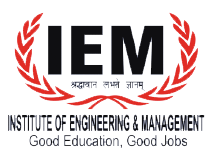2.3 – Teaching- Learning Process
| Metric No. | |||||||||
| 2.3.1.
QlM
|
Student centric methods, such as experiential learning, participative learning and problem
Solving methodologies are used for enhancing learning experiences Faculty members guide the students in their final year projects which are assigned from 2nd year & monitor their progress regarding the same on a monthly basis. Selected projects are also encouraged for submission in different international conferences organised by the institute & the presented papers are published in the conference proceedings. Faculty members also monitor academic performance and counsel them regarding their performance, apart from regular teaching. Experiential learning & Participative learning: To keep the students industry ready, special training programs such as Computer training, Personality development, Spoken English classes are organized. Students are encouraged to take up Industry related projects under the supervision of the teacher/mentor & selected projects are also encouraged for submission in different competitions. To give better exposure to industries the college has entered into MOUs with different organizations (Industry, Universities, research institute, students chapters.) Problem solving methodologies: To keep the students motivated for higher studies, research and government jobs & to enhance their practical problem ability, special training programs are organized every week as SDP, ESP, General studies, Gate classes for competitive exams and higher studies.
|
||||||||
2.3.2 QlM
|
Teachers use ICT enabled tools for effective teaching-learning process. Write descriptionDuring the past few years, the world has witnessed a phenomenal growth in communication technology, computer network and information technology that have created numerous possibilities to use a variety of new technology tools for teaching and learning systems. The integration of computers and communications i.e. Information and Communication Technology (ICT) offers unprecedented opportunities to the education systems with its capacity to interact over a wide geographic area. The following tools are used by the Institute-
|
||||||||
2.3.3 QnM
|
Ratio of mentor to students for academic and other related issues (Data for the latest completed academic year)2.3.3.1 – Number of mentors365
|
